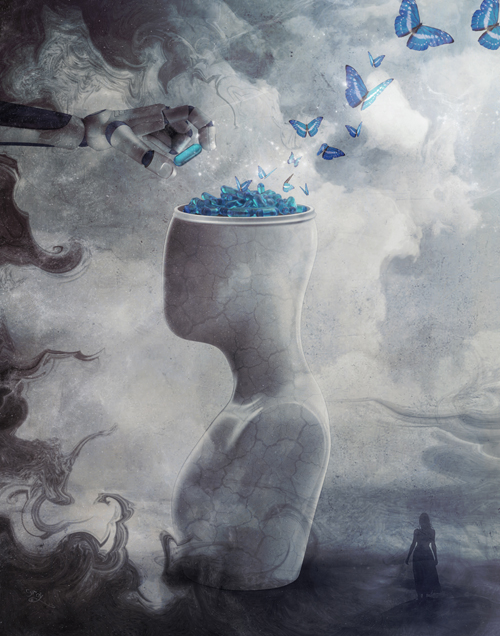
Your complimentary articles
You’ve read one of your four complimentary articles for this month.
You can read four articles free per month. To have complete access to the thousands of philosophy articles on this site, please
Happiness & Meaning
The Happy State
Dan Corjescu says soma could be coming.
Imagine if you will a government which provides its citizens with comfortable housing, and two special daily pills, free of charge. The first pill contains all our daily nutritional requirements, while the second pill guarantees a sense of happiness and contentment throughout the day and night. My question is: would such a state of affairs be both good and desirable?
Many would argue that the universal provision of housing and food would be a general good. Housing and food are required for the furtherance of human thriving, and so for long-term happiness. Without them we would be significantly restrained in pursuing our future projects of self-realization or fulfilling our potential. They’re things we necessarily need to become who we most fully can be. However, our last theoretical provision, the happiness pill, is more controversial.
Once again, one could argue that without some sense of happiness it becomes exceedingly hard to realize oneself and one’s future projects to the full. But one could also argue conversely: that without adversity and struggle human beings fail to fully develop themselves intellectually, spiritually, or morally. Under this view, obstacles must be put in our way by either fate, society, or circumstance for us to become the final best versions of ourselves. In this way, achievement through adversity or overcoming becomes an integral part of being a successful and fully rounded person, and thereby happy in a fuller, Aristotelian sense of the word. Given this the question now becomes, does one need to be generally disgruntled, in various bad moods, or downright seriously unhappy, to be motivated towards self-development? If someone experiences feelings of happiness all the time, day and night, what possible motivation could there be for them to change their life circumstances? If ‘reason is the slave of the passions’ as David Hume famously maintained, what reason could there conceivably be to better ourselves, if our emotive life were continuously bathed in a warm fuzzy feeling of contentment, both with ourselves and our surroundings?

The Happy State by Cameron Gray 2021
We can begin to see how, paradoxically, our theoretical happy pill might easily open the door to an undesirable society – maybe even to the ultimate totalitarian society, in which, as Goethe once said, “The triumph of despotism is to force the slaves to declare themselves free.” For total happiness would afford total control, not unlike the world depicted in Huxley’s prescient novel Brave New World (1932), in which the drug soma plays the same social role as our happy pill. In our happy totalitarianism, all citizens would, indeed, feel themselves to be content, even free. Yet, at the same time, their ability to change, to criticize, to acutely examine themselves and their society and culture, would be sharply curtailed.
Does this mean then that we should instead be arguing for the beneficial moral function of all sorts of misery and discontent in the development of humanity? Such awful states of being did indeed play a not-insignificant part in our historical development. After all, it is the experience of injustice that stimulates the thirst for its opposite. Or more generally, it is the experience of evil that impels us to formulate and seek the good, both politically and individually. In a sense, evil provides us with some necessary form of knowledge that leads us to desire the good, a yet higher state of knowledge. So, moral development might well be a necessary dialectic or dialogue between states of unhappiness, resolved into higher states of happiness. Here a kind of knowledge is attained in the evil state which is in itself insufficient, but through the further exercise of reason the evil is made somewhat more bearable because both its sources and consequences are now better understood. This chimes well with what Socrates said long ago – that evil, which is also a profound state of unhappiness, is done through ignorance, while the good is predicated on knowledge and leads to the most profound state of happiness. In this understanding, happiness is a kind of contented wisdom, gathered, in part, from or through prior states of unhappy ignorance.
Bringing our discussion up to the present day: are we now trending towards our hypothetical pill-popping state of socio-political affairs or some equivalent? The rise of virtual reality should give us pause to reflect here. Could the ever-increasing sophistication and immersive capabilities of virtual reality produce a world where people feel themselves increasingly content, while progressively neglecting the real world? Similarly, will the advance of the biological sciences both genetically and pharmaceutically soon be able to provide an actual happy pill, so that it becomes a real-world problem rather than just a thought experiment? Is Western society – strongly based on the pursuit of individual happiness – heading towards a situation where it will potentially give away its freedoms in exchange for psychological states of contentment, happiness, or joy? And is this not, in itself, a symptom of yet another current existential social condition – that of the loss of control over significant portions of our lives within an increasingly bureaucratic, administrative, oligarchical, globalised world society?
What price then are we eventually willing to pay, for what kinds of happiness?
© Dr Dan Corjescu 2021
Dan Corjescu teaches Cooperation and Conflict, Technology and Society, Globalization, and Environmental Ethics, at the University of Tübingen’s Transdisciplinary Course Program.









